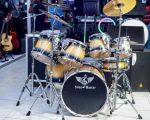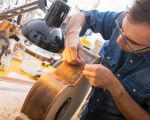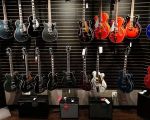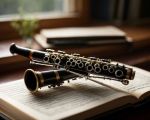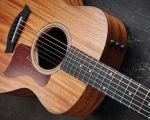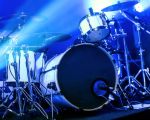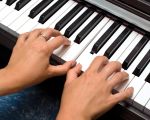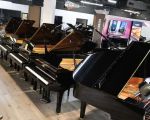How to Choose the Best Music Accessories for Recording
As a musician or producer, creating the perfect recording setup is crucial to ensuring the highest quality audio. Over the years, I've found that choosing the right music accessories can make all the difference in achieving professional sound. Whether you're just starting out or upgrading your home studio, selecting the best recording accessories can significantly impact the quality of your work. In this article, I will walk you through some of the essential music accessories for recording and share tips on how to choose the right equipment for your needs.
Recording music is a rewarding experience, but it can also be a challenge if you're not properly equipped. From microphones to headphones, the variety of accessories available can be overwhelming. That’s why I’m here to help guide you through the process. Let’s dive into the key factors you should consider when selecting the best music accessories for recording.
1. Microphones: The Heart of Your Recording
One of the first decisions I had to make when setting up my recording space was choosing the right microphone. The microphone is arguably the most important piece of equipment in a recording setup. It captures the audio that forms the foundation of your track, and getting it right is essential.
1.1 Dynamic vs. Condenser Microphones
When selecting a microphone, the two main types to consider are dynamic and condenser microphones. Dynamic microphones are durable and ideal for high-pressure environments, making them perfect for live performances or loud instruments like electric guitars. On the other hand, condenser microphones are more sensitive and ideal for capturing vocals and quieter sounds in controlled studio environments. For studio recording, I highly recommend investing in a high-quality condenser microphone, as it will capture more detail and provide clarity in your recordings.
1.2 Choosing the Right Mic for Your Sound
The type of microphone you choose should match the type of music you’re recording. If you’re recording acoustic instruments or vocals, look for a condenser mic with a wide frequency response. For electric guitar or drums, a dynamic mic will handle the volume better and provide a more accurate recording of the sound. Popular choices for both types of microphones include the Shure SM7B for dynamic mics and the Audio-Technica AT2020 for condenser mics. These microphones are known for their durability and excellent sound quality, making them great options for beginners and pros alike.
2. Audio Interface: Connecting Your Instruments to Your Computer
After choosing the right microphone, the next accessory you’ll need is an audio interface. The audio interface is the bridge between your instruments or microphones and your computer. It converts the analog sound signals into digital signals that your recording software can process.
2.1 Importance of Latency and Sound Quality
When selecting an audio interface, one of the most important factors to consider is latency. Latency refers to the delay between the time you make a sound and the time it is recorded by your computer. A low-latency interface is crucial for real-time recording. You also want an interface with high-quality preamps to ensure that your sound is clear and free from distortion. I recommend looking into popular brands like Focusrite Scarlett and PreSonus AudioBox, as both offer excellent audio quality, low latency, and user-friendly features at a reasonable price.
2.2 Inputs and Outputs
Depending on how many instruments or microphones you plan to record simultaneously, make sure to choose an interface with enough inputs and outputs. A 2-input interface is often sufficient for solo artists or smaller setups, but if you plan to record a band or multiple instruments at once, you’ll need one with at least 8 inputs. Having multiple outputs can also be beneficial if you plan to integrate external effects or use multiple speakers.
3. Headphones: Listening with Precision
When recording music, it’s crucial to have a pair of quality headphones to monitor your sound. The right headphones allow you to hear the finer details of your recording, ensuring that everything is mixed correctly.
3.1 Closed-back vs. Open-back Headphones
There are two main types of headphones used for recording: closed-back and open-back. Closed-back headphones are designed to block out external noise and prevent sound from leaking into the microphone, making them ideal for recording. On the other hand, open-back headphones provide a more natural and balanced sound, which is great for mixing, but not ideal for recording. Personally, I recommend using closed-back headphones for tracking and open-back headphones for mixing and mastering. Popular options include the Sennheiser HD280 Pro for closed-back headphones and the AKG K701 for open-back headphones.
3.2 Comfort and Durability
Comfort is also a key factor to consider, especially if you plan on wearing them for long hours. Look for headphones with cushioned ear cups and adjustable headbands for a better fit. Durability is also important, as your headphones will be subject to constant use. I’ve found that Audio-Technica ATH-M50X headphones offer both excellent sound quality and comfort, making them a great investment for any recording setup.
4. Acoustic Treatment: Improving Your Recording Environment
While it’s not technically an accessory, acoustic treatment is essential for achieving the best sound quality when recording. Poor room acoustics can cause issues like unwanted reverb, echo, and poor frequency response, which can affect the quality of your recordings.
4.1 Soundproofing vs. Acoustic Treatment
There’s a common misconception that soundproofing is necessary for a recording space. However, acoustic treatment is far more important. Soundproofing prevents external noise from entering your space, but acoustic treatment is what controls the sound within the room itself. Adding things like bass traps, diffusers, and absorption panels to your studio will help create a more accurate listening environment for recording and mixing.
4.2 DIY Solutions and Professional Products
If you’re on a budget, there are plenty of DIY solutions for acoustic treatment, such as foam panels, blankets, and even pillows. However, if you’re looking for a more professional setup, brands like Auralex Acoustics and Primacoustic offer high-quality acoustic panels and bass traps that will greatly enhance your recording space.
5. Cables and Stands: Don’t Forget the Basics
Finally, it’s easy to overlook basic accessories like cables and stands, but they are crucial for a smooth recording session. High-quality cables will ensure that your sound is transmitted clearly without interference, and sturdy stands will hold your equipment in place while you work.
5.1 Choosing the Right Cables
When choosing cables, look for ones with high-quality shielding to prevent noise interference. XLR cables are typically used for microphones, while TRS cables are often used for connecting instruments. I always make sure to have a set of high-quality cables from trusted brands like Mogami or Monster Cable.
5.2 Stands and Mounts
Investing in good microphone stands and mounts is important for stability and comfort. Adjustable stands can help you position the mic at the perfect height and angle, while mounts can reduce vibration and handling noise. Brands like On-Stage and K&M offer sturdy stands that can hold your equipment securely during long recording sessions.
6. Putting It All Together
Choosing the best music accessories for recording may seem overwhelming at first, but by focusing on the essentials—microphones, audio interfaces, headphones, acoustic treatment, and accessories—you can build a setup that suits your needs and enhances your music production experience. By investing in quality gear and understanding what works best for your music, you’ll be able to create a professional recording environment at home or in the studio.
Ready to enhance your recording setup? Check out our website, Beat Trigger, for more information on the best music accessories for recording and get expert advice on building your dream studio.

